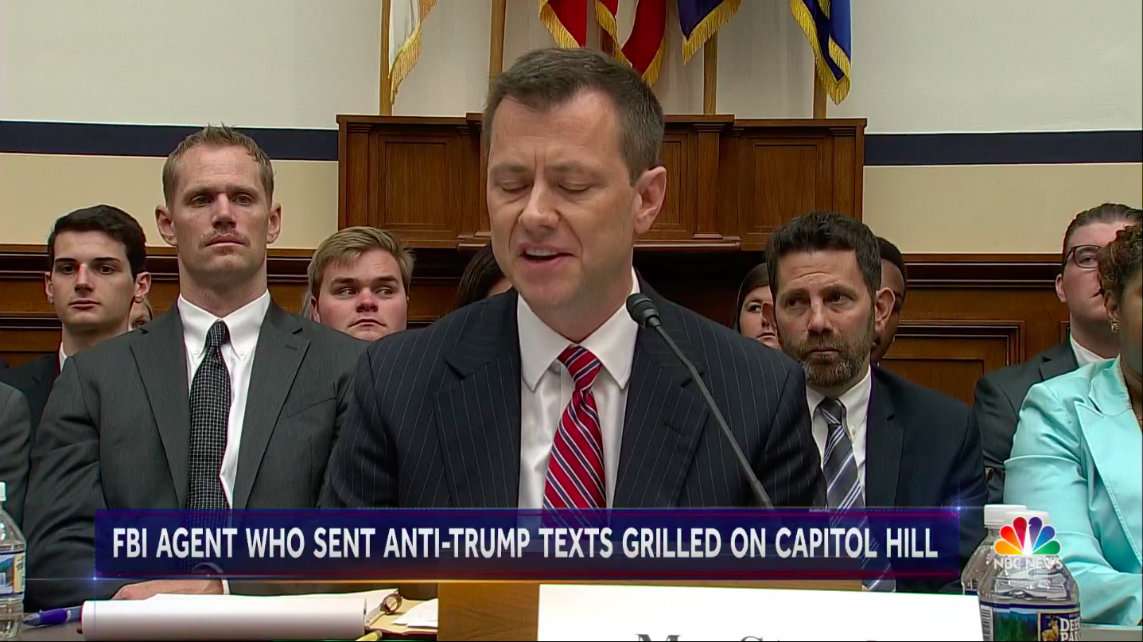Peter Strzok Gets Shouty at 10-Hour Grilling on FBI Agent's 2016 Texts: Reason Roundup
Plus: charges against Stormy Daniels dropped, U.S. loses millions minting pennies, and the perils of "a collective right to attention"


FBI agent Peter Strzok was in the hot seat for 10 hours Thursday, as members of the House Oversight and Government Reform Committee grilled him on texts sent to another agent in the lead-up to the 2016 presidential election. At the time, Strzok was a principal team member on investigations into Hillary Clinton's emails and into possible collusion between the Donald Trump campaign and Russia. Text messages obtained by Special Counsel Robert Mueller show Strzok making disparaging remarks about Trump and, in one message, assuring colleague and romantic partner Lisa Page that "we'll stop" Trump from becoming president.
"Strzok said under aggressive questioning that a much-discussed August 2016 text…followed Trump's denigration of the family of a dead U.S. service member," the Associated Press notes.
He said the late-night, off-the-cuff text reflected his belief that Americans would not stomach such "horrible, disgusting behavior" by the presidential candidate. But, he added in a raised voice and emphatic tone: "It was in no way—unequivocally—any suggestion that me, the FBI, would take any action whatsoever to improperly impact the electoral process for any candidate. So, I take great offense, and I take great disagreement to your assertion of what that was or wasn't."
Republicans on the Congressional committee, including chair Trey Gowdy (R-S.C.), refused to budge on the now-popular GOP narrative that Strzok Gowdy tried to throw the election for Clinton. "Agent Strzok had Hillary Clinton winning the White House before he finished investigating her," Gowdy told the committee. "Agent Strzok had Donald Trump impeached before he even started investigating him. That is bias."
Goodlatte threatened Strzok with contempt. Gohmert accused Strzok of perjury and mentioned his wife and affair. And Darrell Issa forced Strzok to read his own text messages aloud—including ones that included vulgarities. A look at today's "3-ring circus": https://t.co/LZROSOCc7p
— Natasha Bertrand (@NatashaBertrand) July 13, 2018
By the day's end, the hearing "devolved into shouting matches, finger-pointing and veiled references to personal transgressions," says the AP. Throughout the circus, Strzok insisted that his personal feelings about Trump didn't affect his job, pointing out that he had also criticized Clinton and Sen. Bernie Sanders in his messages but had never leaked information or let negative views of any candidate bias his work.
"What I am telling you is I and the other men and women of the FBI, every day take our personal beliefs, and set those aside in vigorous pursuit of the truth—wherever it lies, whatever it is," said Strzok.
"And I don't believe you," responded Rep. Ted Poe (R-Texas).
FREE MINDS
A collective "right to attention"? Our increasingly paranoid national discourse on "Russian influence" on U.S. elections reveals a strange new statist tendency: governments (and those that love them) asserting "a collective right to attention." Those with "fears over 'election-hacking' in the 2016 U.S., U.K., French and German elections," laments Julia Slupska, seldom stop to ponder a more fundamental question: "If a state interferes with another state's politics, is it wrong? On what grounds?"
More from Slupska's recent Libertarianism.org post:
[H]ow can we object to foreign interference without implicitly justifying information control? Complaints over foreign propaganda have uncomfortable implications: if funding online advertisements counts as unacceptable foreign meddling, why doesn't funding radio stations like Radio Free Europe (as Russia Today points out)? What—precisely—is unethical about interference anyway? This blog posts suggests that we might be able to find some clarity on these issues from an unexpected source: the emerging literature on digital design ethics.
Digital environments are often designed to pilfer your attention. The '…' that comes up when you're waiting for someone to text you back keeps you at your screen, waiting for a reward. Facebook and Twitter feeds auto-refresh without prompting to keep you scrolling. Bright red notifications remind us of our desire for social interaction. Persuasive design might be annoying, but is it also in some sense unethical?
Many say yes. "An emerging literature on the ethics of attention seeks to…create ethical guidelines for technology designers, primarily those whose business model is based on advertising" and "suggests that attention-grabbing intrusions can be unethical," especially "when systematic distractions infringe on individual freedom and agency," notes Slupska. She believes these concerns present "a useful framework for understanding disruptive and confusing phenomena in modern politics," such as fears over "election-hacking."
Current debates underappreciate the extent to which election-hacking is about conflict over attention rather than information. Leading scholars of state propaganda have noted that states are increasingly focusing on amplification of government opinion rather than censoring specific information. Our limited ability to consume information is key to these strategies; consequently, political theory needs to incorporate the ethics of attention. This suggests a startling new reality: just as states traditionally competed for resources like territory or oil, they now seem to be competing for attention.
Read the whole thing here.
FREE MARKETS
We're losing tens of millions of dollars per year minting U.S. pennies. In 2017, "the U.S. Mint produced more than 8.4 billion pennies for circulation," reports Government Executive. "Between production costs and shipping, they cost $0.0182 each, which totaled to $69 million…in losses compared to their total value—the biggest in nine years." The rising cost of zinc, which makes up the bulk of penny composition, is one of the culprits. Nickels are also money-losers for the government, but "the Mint makes up the losses incurred on pennies and nickels with its 10- and 25-cent coins, and last year reported making $391.5 million in seigniorage."
FOLLOW-UP
Daniels dances again. The charges against Stormy Daniels for allegedly violating an Ohio strip-club law while dancing in Columbus this week have been dropped. Daniels performed at a different Columbus club Thursday night, saying that proceeds would go to the defense of the two other dancers arrested with her. The arrests are part of what Columbus cops have called an ongoing "human trafficking" operation.
Saddened to hear the other 2 dancers arrested with me last night did not have their charges dropped. All tips from my stage performance tonight at Sirens in Columbus will go towards their legal fees. Come support the working women of this city. #letussurvive
— Stormy Daniels (@StormyDaniels) July 12, 2018
QUICK HITS
- The Trump administration says it "has complied with the first part of a court order to return the nearly 3,000 migrant children separated from their parents in recent months," NPR reports.
- An update on the World Health Organization's alleged inclusion of sex addiction and gaming addiction as mental disorders.
- The Justice Department is fighting the planned merger of AT&T and Time Warner.
- Asians have displaced blacks "as the most economically divided group in the U.S.," according to a new study from Pew Research.
- Woodchucks #Resist Paul Ryan.
